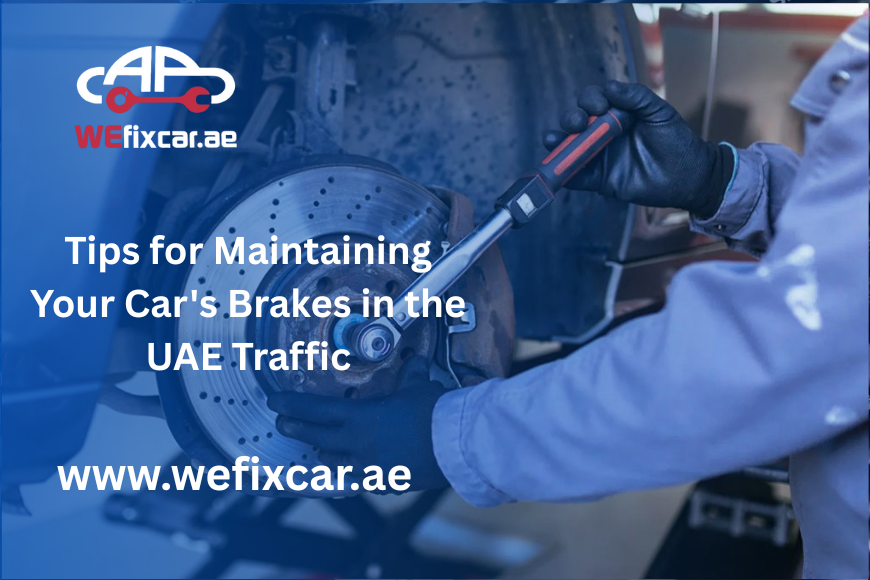In the bustling roads of the UAE, where heavy traffic is a common sight, maintaining your car’s brakes is essential for safety. Whether you’re driving through the busy streets of Dubai, Abu Dhabi, or any other city, having reliable brake performance is crucial to avoid accidents and ensure smooth driving. With extreme weather conditions, especially during the hot UAE summers, your car’s braking system faces added stress. Proper brake maintenance is key to maintaining stopping power, minimizing wear, and ensuring your vehicle’s safety.
1. Importance of Brake Maintenance in the UAE
The harsh temperatures in the UAE can have a significant impact on the performance of your car brakes. Extreme heat can cause brake fluid to degrade, and it can also result in the brake pads and discs wearing down faster. In the dense traffic conditions common in cities like Dubai and Abu Dhabi, frequent braking adds to the stress on your braking system, making it essential to ensure regular brake maintenance.
Without proper maintenance, you risk compromised braking efficiency, which can lead to longer stopping distances and, in extreme cases, brake failure. Ensuring your car’s brakes are in good condition gives you peace of mind, especially in emergency situations.
2. Signs Your Brakes Need Attention
Your brakes can give you clear signs when they need attention. It’s important to be aware of these symptoms, especially when driving in the UAE’s heavy traffic. Here are a few signs that your brakes may need maintenance or repair:
- Squeaking or Squealing Sounds: If you hear a high-pitched squeal when pressing the brake pedal, it might indicate that the brake pads are worn and need replacement. This sound can also result from debris stuck in the brake system, which can be removed during maintenance.
- Grinding Sounds: A grinding noise when braking is more concerning, as it often signals that the brake pads are completely worn out and the metal of the brake disc is rubbing against the rotor, which can cause significant damage.
- Vibrations When Braking: If you feel vibrations or pulsations when applying the brakes, this could be a sign of warped brake discs. This can affect the smoothness of your braking performance and may require resurfacing or replacement of the discs.
- Increased Stopping Distance: If your car is taking longer to stop than usual, it could be a sign that the brake fluid is low or that the brake pads are worn down, leading to reduced stopping power.
- Soft or Spongy Brake Pedal: A soft brake pedal that feels spongy when pressed indicates that there might be air in the brake lines or a problem with the brake fluid, which can compromise the entire braking system.
3. Brake Maintenance Tips for the UAE
Proper brake maintenance ensures your vehicle performs optimally and remains safe on the roads. Here are some essential tips for maintaining your car’s brakes in the UAE:
Regularly Check Brake Fluid Levels
Brake fluid is essential for the functioning of your brakes. The fluid transfers force from the brake pedal to the braking components, ensuring that the car stops efficiently. In extreme temperatures, brake fluid can degrade faster. Ensure you check the brake fluid levels regularly, especially before long trips or during the summer months. If the fluid appears low or contaminated, it’s best to get it replaced by a professional.
Inspect Brake Pads and Brake Discs
Over time, the brake pads wear down due to friction, reducing their effectiveness. It’s important to inspect the brake pads regularly for wear and tear. If the brake pads are thin, they should be replaced immediately to avoid damage to the brake discs. Similarly, the brake discs or rotors should be checked for any grooves, cracks, or warping, as these issues can affect braking performance.
Brake Pads Replacement
In the UAE, brake pads tend to wear faster due to the frequent start-stop driving in traffic. Typically, brake pads need replacement every 25,000 to 50,000 kilometers, depending on driving habits. However, in the UAE, with its constant heat and heavy traffic, it’s advisable to check your brake pads more frequently, especially if you notice any squeaking or grinding sounds.
Brake Disc Resurfacing or Replacement
If your brake discs are warped or damaged, they should either be resurfaced or replaced. Warped discs can cause the brakes to vibrate, reducing the effectiveness of the braking system and potentially causing damage to other components.
Regular Brake Inspections
Even if you don’t notice any problems with your brakes, it’s still important to schedule regular brake inspections. An expert mechanic will be able to identify potential issues with your brake pads, fluid, and discs before they become a major problem. Brake repair should never be postponed, especially in high-traffic areas like Dubai.
Choose the Right Brake Pads for UAE Driving Conditions
Different types of brake pads are available, including organic, metallic, and ceramic options. In the UAE’s climate and driving conditions, ceramic brake pads are often the best choice. They are more durable and provide better performance in hot temperatures, making them suitable for both city driving and long-distance travel.
Avoid Overheating Your Brakes
Excessive braking in heavy traffic or driving on steep roads can cause your brakes to overheat. This can lead to brake fade, where the braking power is reduced. To prevent this, avoid unnecessary heavy braking. If you’re driving down steep slopes, consider using engine braking (reducing speed by shifting to a lower gear) to avoid overheating the brakes.
4. Why Brake Maintenance is Crucial for Traffic Safety in the UAE
Traffic safety is a critical concern in the UAE, especially in cities like Dubai and Abu Dhabi, where roads are busy and traffic conditions can be unpredictable. Brake maintenance is essential for protecting not only your car but also the safety of other road users.
Maintaining your brake system ensures:
- Quick Response Time: When you need to stop suddenly in an emergency, your brakes should respond promptly. Regular maintenance guarantees that your braking system is always ready for action.
- Preventing Brake Failure: In a busy traffic environment, brake failure can be catastrophic. Proper brake service can prevent costly and dangerous breakdowns.
- Optimizing Vehicle Performance: Well-maintained brakes ensure that your vehicle operates at peak efficiency, improving fuel economy and reducing overall maintenance costs over time.
Call to Action
Maintaining your car’s brakes in the UAE is essential for ensuring your safety in heavy traffic and hot climates. Regular brake checks, fluid top-ups, and timely replacement of brake pads and discs can prevent costly repairs and guarantee your car’s stopping power. If you notice any signs of brake wear or feel that your brakes are not functioning properly, don’t hesitate to consult a professional for a thorough inspection. Prioritize brake maintenance today to stay safe on the UAE’s busy roads.
FAQs – Car Brakes Maintenance in the UAE
1. How often should I check my car’s brakes in the UAE?
It’s advisable to inspect your car’s brakes every 10,000 kilometers or at least once every six months, especially considering the heat and traffic in the UAE. However, if you hear unusual sounds or feel any changes in brake performance, check them immediately.
2. How do I know if my brake pads need replacing?
If you hear squeaking or grinding noises when braking or notice reduced braking efficiency, it’s time to replace your brake pads. Worn-out brake pads can damage the brake discs and significantly affect stopping power.
3. Can I drive with worn brake pads?
Driving with worn brake pads is risky as it can compromise your stopping ability. If the pads are worn down too much, it can also damage the brake discs, leading to more expensive repairs.
4. What are the most common brake issues in the UAE?
In the UAE, the most common brake issues are worn-out brake pads due to the frequent stop-and-go traffic, low brake fluid levels, and overheating of the braking system due to the extreme heat.5. How can I prevent brake overheating in traffic?
To prevent brake overheating in traffic, avoid excessive braking. If you’re on a steep slope, use engine braking to reduce speed and save your brakes from overworking



